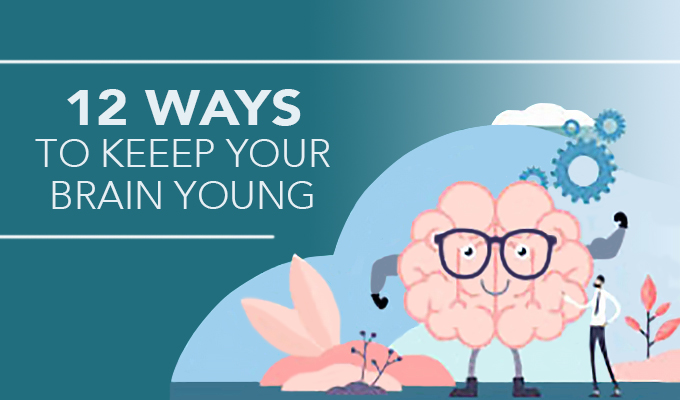12 Ways to Keep Your Brain Young
Most of us recognize that staying active and eating healthy are important to staying fit and living a long, active life. However, you might not think much about brain health until you reach an age where it becomes more of a concern. It’s never too early to start taking care of this most vital organ. Whatever your age, there are habits you can cultivate to support and maintain brain function and according to research, even ways to reverse aging by encouraging stem cell production.
Many of the changes that can help brain health are relatively simple, to the point that you might not associate them with better cognitive function. Starting with the basics is always necessary to provide a strong foundation for health.
Exercise
Just 30 minutes of daily exercise can help reduce brain cell loss! Research has shown that physical activity can slow brain aging by 10 years. Further, it has been shown that dancing is advantageous for both maintaining and reversing signs of aging in the brain because it engages multiple areas for hand-eye coordination, execution and control of voluntary movement and the planning of fine and complex motor actions. Just dance!!
Maintain Your Social Life
People that have good social ties live longer and research suggests that people who are more socially engaged and have larger social networks tend to have a high level of cognitive function. Stay social!!
Use All Your Senses
Keep your eyes and ears sharp. Not only is it important for your senses to function properly in order for the brain to process your surroundings, but this can also have a major impact on social interaction. Those with hearing impairments may be less likely to engage with family and friends, which plays a big role in both brain and mental health. Eyes and ears open!!
Keep Learning
Like a muscle, your brain needs to be exercised to stay healthy. Taking on new hobbies and learning new things is a great way to keep the brain working well. Engage in puzzles, trivia, games, reading, drawing, painting and other crafts, anything that stimulates mental activity. Exercise your brain!!
Make Healthy Lifestyle Choices
Avoiding smoking and excessive alcohol is helpful, but it’s important to avoid toxins that may be lurking in places you might not consider. Processed foods are full of chemicals and inflammatory oils that wreak havoc on cells throughout the body. Most conventional body products, including shampoo, lotions and deodorant contain harmful phthalates and other substances that are absorbed by the skin within seconds. Healthy choices!!
Keep Your Levels in Check
High cholesterol and diabetes have both been linked with dementia. This is really important because there are risk factors associated with cognitive decline, including high blood pressure, high cholesterol, obesity and blood sugars. Check your levels!!
Manage Stress
Stress can kill brain cells and even reduce the size of the brain. Chronic stress has a shrinking effect on the prefrontal cortex, the area of the brain responsible for memory and learning. Studies have shown that meditation, yoga and spending time in nature are effective ways to reduce feelings of stress and overwhelm. Less stress!!
Get Sufficient Sleep
Sleep is important to a number of brain functions, including how nerve cells communicate with each other. In fact, your brain and body stay remarkably active while you sleep. Sleep plays a housekeeping role that removes toxins in the brain that build up while you are awake, so don’t be shy about sleeping more than eight hours. More sleep!!
Focus on Gut Health
Research has shown that there is a vital connection between the gut and the brain. Several neurotransmitters are made in the gut, including up to 90% of serotonin. This is crucial for communication within the nervous system, but also for a healthy mood. Address digestive issues and be sure to include pre- and pro-biotics daily. Gut matters!!
Eat Right
No matter how many diet trends come and go, research supports that both the Japanese and Mediterranean-style diets are some of the best anti-inflammatory ways of eating. Healthy fats high in Omega-3, key to brain health and mood, high fiber and antioxidant-rich vegetables, grains and herbs. Focus on nutrient deficiencies then add them to your diet and supplement regimen; especially targeting protein, calcium, fiber, zinc, magnesium, iron and copper. Diet counts!!
Hydrate, Hydrate, Hydrate
Staying properly hydrated enables the brain to stay alert so we can keep our attention and focus. Drinking water also regulates the brain’s temperature and gets rid of toxins and dead cells. Studies have identified a link between dehydration and mood disturbances, showing that adequate hydration is just as important for mental health as it is for physical health. Drink lots of water!!
Address Oxidative Stress
Oxidative stress is a major contributing factor to aging in the brain and the body as a whole. Because the body’s ability to produce its own antioxidants declines with age, it is imperative to make lifestyle choices that reduce exposure to toxins and other things that create oxidative stress in the body. Proper levels of antioxidants leads to the production and function of neurotransmitters, supports the production of hormones and stem cells, which is key to keeping the brain functioning at its best. More antioxidants!
And finally, remember to Protect Your Head! Moderate to severe head injuries, even without diagnosed concussions, increase the risk of cognitive impairment.




